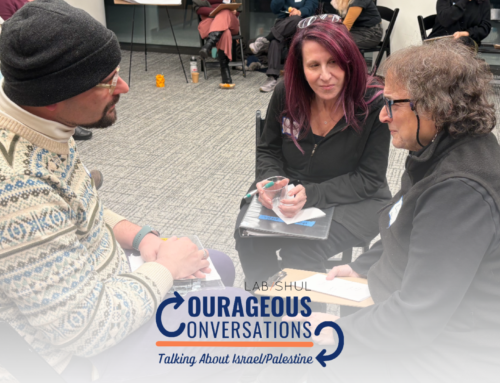[Based on a conversation between Rabbi Amichai Lau-Lavie with Hashivenu: Jewish Teachings on Resilience podcast host, Rabbi Deborah Waxman, April 30, 2025]
The transition in Israel from Yom Hazikaron, the day of remembering the enormous prices paid for the existence of Israel over these years, into the very next day, Yom Ha’azma’ut, Israel’s Independence Day, is always fraught with a lot of fragility. This year, we are in the middle of a war that seems relentless and endless, with casualties that are hurting Israeli homes and hearts, and the devastation for Palestinians who are homeless and foodless in Gaza.
Raised in a Religious Zionist Household
My family in Jerusalem just sent me the WhatsApp videos of their sitting around the festive table. The table is set, as it has been every year of my life, for the holiday of Yom Ha’atzma’ut, and for my birthday. I was born on the eve of Independence Day. I am named Amichai, “My people live,” because I was born only minutes after the siren that separates Memorial Day from Independence Day. There are strawberries on the birthday cake that’s on the table in Jerusalem because my father kept telling my mother: “Don’t give birth during Memorial Day. Keep pushing, keep waiting.” For some reason, he thought that her eating strawberries would extend labor. In the family myth, it did work, and therefore there are strawberries on the cake. The cake is two-tier, one tier for the State of Israel, and one for me.
I am a product of a religious Zionist household that is now in crisis because the religious Zionism I grew up with has been hijacked by fundamentalist, extremist zealots. In the video, they are all celebrating: my mother, at 95 years old, my older brother Benny, a religious Zionist rabbi, and two of his sons, who are on reserve duty and in uniform. Everyone is exhausted from over a year and a half of battle, but they are praising this moment. They sing Hallel, the prayers of praise, with a blessing, because their view of the State of Israel is not about the here and now of the political reality and the terrible situation we’re in. Their eyes are on the prize of a much bigger reality.
You can say it’s messianic, you can say it’s spiritual. But as children of Holocaust survivors, which my siblings and I are, it is about a dream that at this point, 77 years later, is partially manifested. I don’t want to poo-poo the successes and the positivity, but on many levels, it is also a nightmare. It is especially a nightmare for Palestinians.
Combating Despair
And so the words of the Psalm (126:1), Hayinu kekholmim, “We were as dreamers when we returned to Zion,” is on my mind and in my heart tonight. What is the dream we want to dream that will release us from this current rupture and will enable us to co-create a reality where my dream is not somebody else’s nightmare?
One of the biggest challenges of the moment is despair and dismissal. The dream feels so far away that it is impossible. Part of the work of this moment is to help other people remember what the dream is and redouble efforts to try — in ways we can imagine, and in ways we can’t yet imagine — to keep fighting for that vision. It is the vision of the Israeli Declaration of Independence, a vision of an equality of everyone who’s living in the land. It is a vision that is democratically inspired and life-giving. I’m so grateful that the vision exists. I continually orient myself to it.
We might lose — the progressives, the liberals, we who are queer, we who are feminist, we who are humanists, we who believe in the human agency to live out your destiny and not always defer to the collective, which is how our patriarchal legacy has led the day for most of our history.











